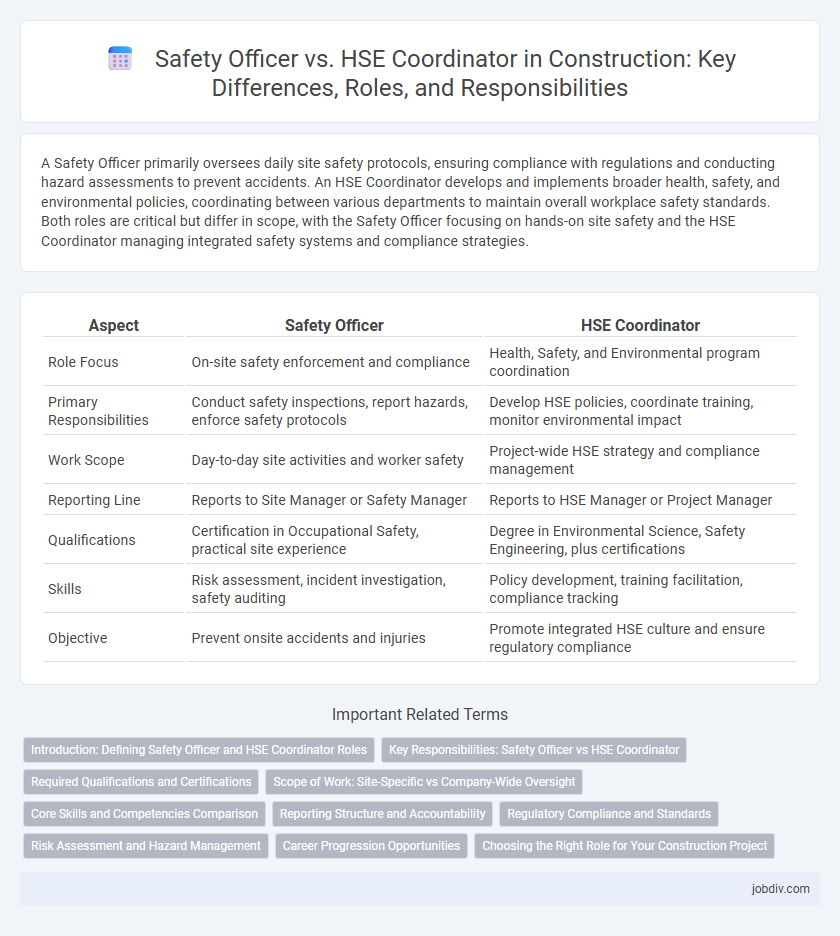A Safety Officer primarily oversees daily site safety protocols, ensuring compliance with regulations and conducting hazard assessments to prevent accidents. An HSE Coordinator develops and implements broader health, safety, and environmental policies, coordinating between various departments to maintain overall workplace safety standards. Both roles are critical but differ in scope, with the Safety Officer focusing on hands-on site safety and the HSE Coordinator managing integrated safety systems and compliance strategies.
Table of Comparison
| Aspect | Safety Officer | HSE Coordinator |
|---|---|---|
| Role Focus | On-site safety enforcement and compliance | Health, Safety, and Environmental program coordination |
| Primary Responsibilities | Conduct safety inspections, report hazards, enforce safety protocols | Develop HSE policies, coordinate training, monitor environmental impact |
| Work Scope | Day-to-day site activities and worker safety | Project-wide HSE strategy and compliance management |
| Reporting Line | Reports to Site Manager or Safety Manager | Reports to HSE Manager or Project Manager |
| Qualifications | Certification in Occupational Safety, practical site experience | Degree in Environmental Science, Safety Engineering, plus certifications |
| Skills | Risk assessment, incident investigation, safety auditing | Policy development, training facilitation, compliance tracking |
| Objective | Prevent onsite accidents and injuries | Promote integrated HSE culture and ensure regulatory compliance |
Introduction: Defining Safety Officer and HSE Coordinator Roles
Safety Officers oversee on-site compliance with safety regulations, conduct risk assessments, and enforce protective measures to minimize workplace hazards. HSE Coordinators develop, implement, and monitor comprehensive health, safety, and environmental programs aligned with organizational policies and legal standards. Both roles are vital in promoting a safe construction environment but differ in scope, with Safety Officers focusing on operational safety and HSE Coordinators managing strategic health and environmental initiatives.
Key Responsibilities: Safety Officer vs HSE Coordinator
Safety Officers primarily focus on enforcing workplace safety protocols, conducting regular site inspections, and ensuring compliance with OSHA standards to minimize accident risks. HSE Coordinators oversee the development and implementation of health, safety, and environmental programs, coordinate training sessions, and manage incident investigations to promote a culture of safety across the organization. Both roles require strong communication skills and thorough knowledge of regulatory requirements but differ in scope, with Safety Officers concentrating on operational safety and HSE Coordinators handling strategic safety planning and environmental compliance.
Required Qualifications and Certifications
Safety Officers typically require certifications such as OSHA 30-Hour Construction Safety and Health and NEBOSH Construction Certificate, emphasizing practical site safety enforcement and hazard identification. HSE Coordinators often hold higher-level qualifications like NEBOSH International Diploma and Certified Safety Professional (CSP), demonstrating expertise in developing comprehensive health, safety, and environmental management systems. Both roles demand strong knowledge of OSHA regulations and construction industry standards, but HSE Coordinators focus more on policy implementation and auditing processes.
Scope of Work: Site-Specific vs Company-Wide Oversight
Safety Officers concentrate on site-specific safety management, ensuring compliance with regulations and conducting risk assessments tailored to individual construction sites. HSE Coordinators oversee company-wide health, safety, and environmental policies, implementing standardized procedures across multiple projects to maintain organizational safety standards. This distinction highlights the Safety Officer's hands-on approach versus the HSE Coordinator's strategic, overarching role in construction safety management.
Core Skills and Competencies Comparison
Safety Officers excel in hazard identification, risk assessment, and enforcing safety protocols on construction sites, ensuring compliance with OSHA regulations and immediate incident response. HSE Coordinators possess advanced competencies in comprehensive health, safety, and environmental management systems, policy development, and cross-departmental coordination to promote sustainable safety culture and regulatory adherence. Both roles require strong communication skills, emergency preparedness, and proficiency in incident investigation, but HSE Coordinators emphasize strategic planning and continuous improvement initiatives.
Reporting Structure and Accountability
The Safety Officer primarily reports to the site manager and is accountable for implementing safety protocols and conducting site inspections. The HSE Coordinator typically reports to the HSE Manager and oversees compliance with health, safety, and environmental regulations across multiple projects. Accountability for the Safety Officer centers on daily operational safety, while the HSE Coordinator is responsible for strategic coordination and reporting of HSE performance metrics to senior management.
Regulatory Compliance and Standards
A Safety Officer ensures daily adherence to occupational safety regulations and enforces site-specific safety procedures, minimizing risks and preventing accidents. An HSE Coordinator oversees the implementation of comprehensive Health, Safety, and Environmental standards across projects, aligning company policies with national and international regulatory frameworks such as OSHA and ISO 45001. Both roles collaboratively monitor compliance documentation and conduct regular audits to maintain regulatory conformity and promote a culture of safety.
Risk Assessment and Hazard Management
Safety Officers conduct detailed risk assessments by identifying potential onsite hazards and implementing immediate control measures to mitigate risks. HSE Coordinators oversee comprehensive hazard management programs, ensuring compliance with occupational health and safety regulations while coordinating safety training and incident investigations. Both roles collaborate to maintain a proactive safety culture, emphasizing continuous monitoring and improvement of risk control strategies in construction environments.
Career Progression Opportunities
Safety Officers typically focus on enforcing workplace safety regulations and conducting risk assessments, making them vital at the operational level within construction sites. HSE Coordinators take a broader role by implementing comprehensive health, safety, and environmental programs, offering opportunities to manage cross-functional teams and influence company-wide safety policies. Career progression from Safety Officer to HSE Coordinator enables professionals to transition from site-specific responsibilities to strategic roles that drive organizational safety culture and compliance.
Choosing the Right Role for Your Construction Project
Selecting between a Safety Officer and an HSE Coordinator hinges on project scope and safety requirements; Safety Officers focus on enforcing site-specific safety regulations and conducting daily inspections, while HSE Coordinators develop comprehensive health, safety, and environmental policies across multiple projects. Construction projects with complex regulatory compliance and multi-site operations benefit from an HSE Coordinator's strategic oversight and risk management expertise. Prioritizing the appropriate role enhances safety culture, reduces incidents, and ensures adherence to OSHA standards and environmental regulations.
Safety Officer vs HSE Coordinator Infographic

 jobdiv.com
jobdiv.com